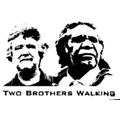Comparing languages reveals things we didn't know we didn't know.
I love to listen to ABC radio documentaries while driving, especially NPR summer series, and yesterday I was not disappointed on hearing part of Grammar, Identity, and the Dark Side of the Subjunctive. It got me reflecting on how Murray, John and I went about making Two brothers Walking.
We made the documentary with very little. We had sponsorship for travel and accommodation and some funding for post production and launch. I approached various funding bodies early on but since we were working along cultural lines I was confident though not certain that we would complete a film for a general audience. We intended to film significant cultural material so final approval would be up to the people responsible for that Tjukurpa. I knew the my Anangu friends looked at the world wasn’t the same as my english speaking western way, and I suspected there were things I didn’t know that weren’t even on my radar.
We made the documentary with very little. We had sponsorship for travel and accommodation and some funding for post production and launch. I approached various funding bodies early on but since we were working along cultural lines I was confident though not certain that we would complete a film for a general audience. We intended to film significant cultural material so final approval would be up to the people responsible for that Tjukurpa. I knew the my Anangu friends looked at the world wasn’t the same as my english speaking western way, and I suspected there were things I didn’t know that weren’t even on my radar.
When we were shooting at Nyapari, one of the Toyota’s tyres had a slow leak. I asked Murray what was the best way to go about fixing it, thinking that I would get an explanation of what needed to be done and how to go about it. Not so. Murray said in a most direct way, “Bring it over to the air pump and you can watch me (break the bead, remove the split rim and patch the leak).” Through his eyes there was a problem that needed to be fixed immediately and I was asking for his help. On the other hand, I was wondering whether I had the necessary tools, if now was a convenient time for repairs or should I use one of my spares for the time being. I was formulating a plan.
We’ve had this conversation, talking at crossed purposes many times. I might be possibilities and hypotheticals, Murray would think specifics and be getting ready for action. It isn’t that Pitjantjatjara doesn’t allow for considering alternatives, it does. It is that as far as I can see, traditional life turns on a different axis; talk about what you know, what you can and are responsible for doing. It is anchored in the present moment and guided by ngarpitji ngarpitji, a world view based on holistic flow rather than individual transactions.
Just as one came claim to know how to do something once one has done it, I wanted to make the film to demonstrate that we could, and in the process adhere to cultural ways of doing things. Two Brothers Walking is embedded in both traditional and conventional practices, and we will explore more in our storytelling this year.
I am very interested in your observations of traditional and western attitudes and perspectives.
blog comments powered by Disqus
